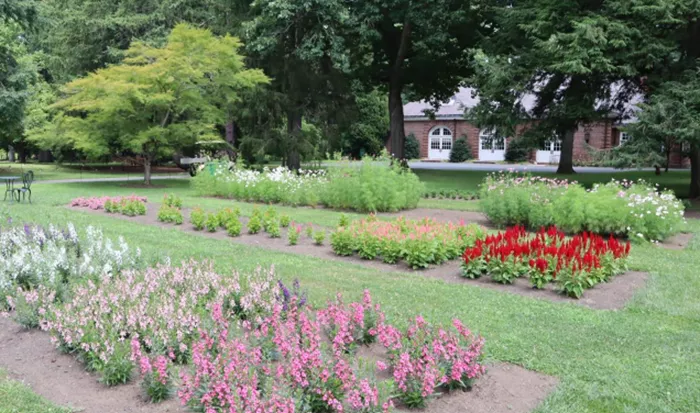At the Massachusetts Horticultural Society, our annual field trials are essential for testing new plant varieties and gathering data on their performance in local conditions. This year, we continued collaborations with Proven Winners and All-America Selections (AAS), as well as partnered with Harmony Harvest Farm to trial new chrysanthemum varieties. These partnerships allowed us to evaluate both established and emerging plants, providing valuable insights for both gardeners and horticulturists in the region.
The 2024 trials featured a wide range of ornamental and edible plants, including varieties from Proven Winners, AAS, and new crops. These trials tested how well the plants adapted to New England’s unpredictable climate. The results will influence future garden displays and plant selections at the Massachusetts Horticultural Society, while also providing valuable data to our partners. This year’s trials were especially impacted by the variable weather, which tested the resilience of many varieties.
The weather was a key challenge, with periods of sun, rain, and extended cloudy spells. While sunny days encouraged growth in sun-loving plants like Helianthus ‘Suncredible Double Yellow’ and Angelonia ‘Angelface’, the cloudy, cooler periods led to plant diseases, especially fungal infections like powdery mildew. The fluctuating temperatures also caused stress, with cool-weather crops like Cosmos thriving early but later succumbing to wilt disease as humidity increased.
This year, we trialed 50 plant varieties, ranging from ornamentals to edibles. These included Proven Winners’ Angelonia ‘Angelface’ and Dahlia ‘Virtuoso’, along with AAS varieties such as Celosia, Cosmos, and Petunia F1.
Despite the weather challenges, the trials were successful, with some varieties standing out. Scaevola ‘Whirlwind’ performed exceptionally well in all three colors (Blue, Pink, and White), showing resilience to both wet and dry conditions. On the other hand, Cosmos plants, while initially vibrant, were ultimately affected by wilt disease due to the humid, cloudy weather.
Among the top-performing varieties were:
Angelonia ‘Angelface’, with consistent blooms that impressed visitors, especially the ‘Blue’ and ‘Wedgwood Pink’ varieties.
Dahlia Virtuoso, particularly ‘Classy Carmine’, known for its bold blooms and strong structure that held up well in the rain.
Marigold F1 Siam Series, which produced large, bright orange blooms that stood out in the garden, along with the striking bicolor ‘French
Double Contrast’.
Scaevola ‘Whirlwind’, which thrived in both sun and partial shade and showed minimal disease issues.
Zinnia, which produced vibrant, long-lasting blooms.
Several unique observations also emerged:
The Marigold F1 Siam series yielded some of the largest blooms we’ve seen, consistently attracting attention with its vivid colors.
Dahlia Virtuoso, especially ‘Classy Carmine’, maintained a lush display even after rain, demonstrating strong weather resistance.
The Pepper Mini F1 showed exceptional resistance to bacterial leaf spot, a difficult disease to manage.
The Tomato Cherry F1 series outperformed other varieties in yield, flavor, and disease resistance.
The biggest challenge this year was managing fungal diseases, which thrived in the cloudy, cool conditions. While some plants, like Cosmos, began the season strong, they were quickly affected by wilt disease as the humid weather took hold. Despite efforts to reduce humidity, such as improving airflow and adjusting watering practices, the disease spread rapidly.
These trials highlighted the importance of testing a diverse range of plants. Some varieties thrived despite the challenges, while others struggled with disease. The results will help guide future plant selections for both ornamental displays and vegetable crops. Visitor feedback also plays a crucial role in shaping the trials for the next season.
Related topics:
- City Hosts Native Plant Giveaway and Guided Tour at Legacy Park
- How Plant Roots Shift Their Growth During ‘Puberty’ and What It Means for Climate-Resilient Farming
- SIU’s Touch of Nature: Eradicating Invasive Plants and Reviving Native Flora and Wildlife


